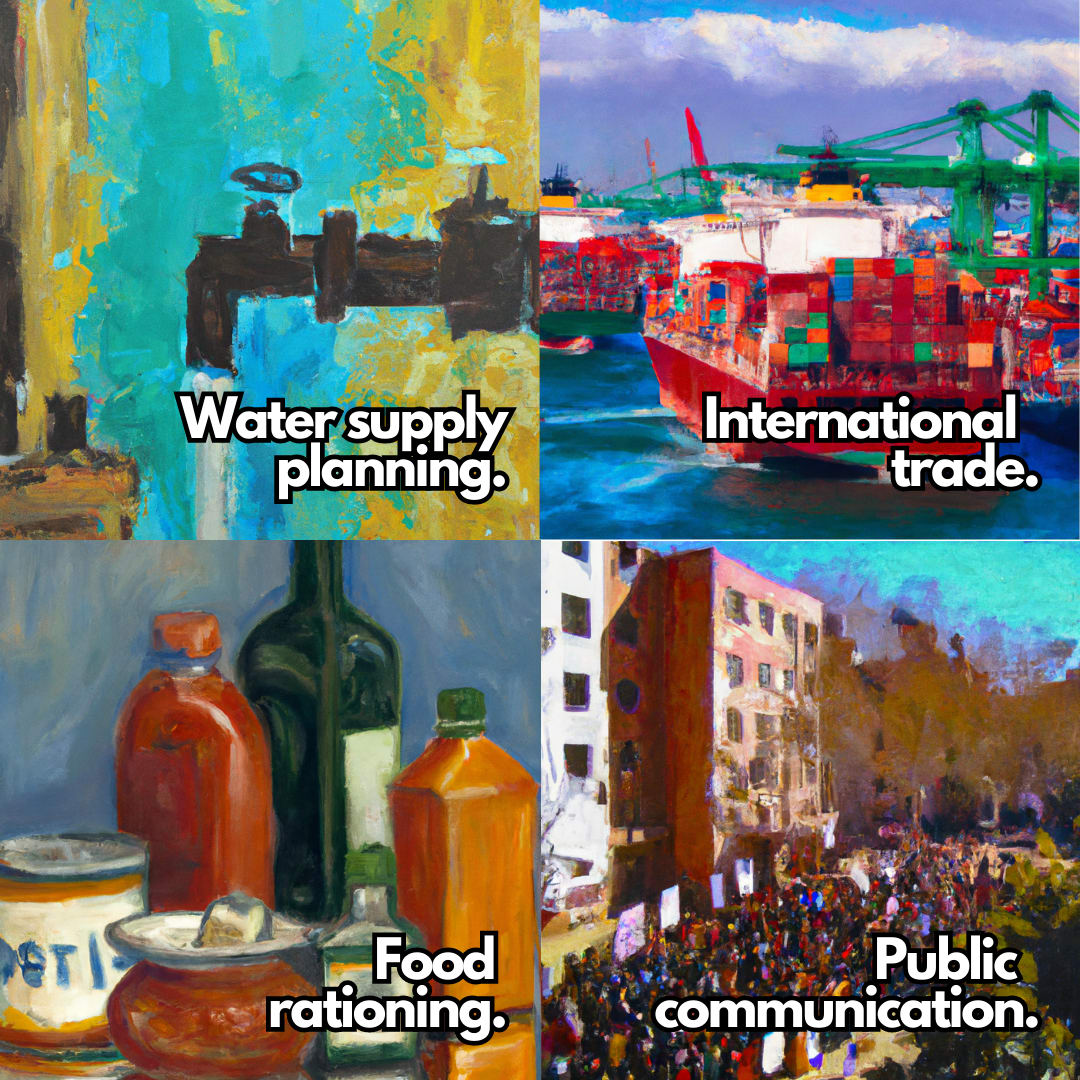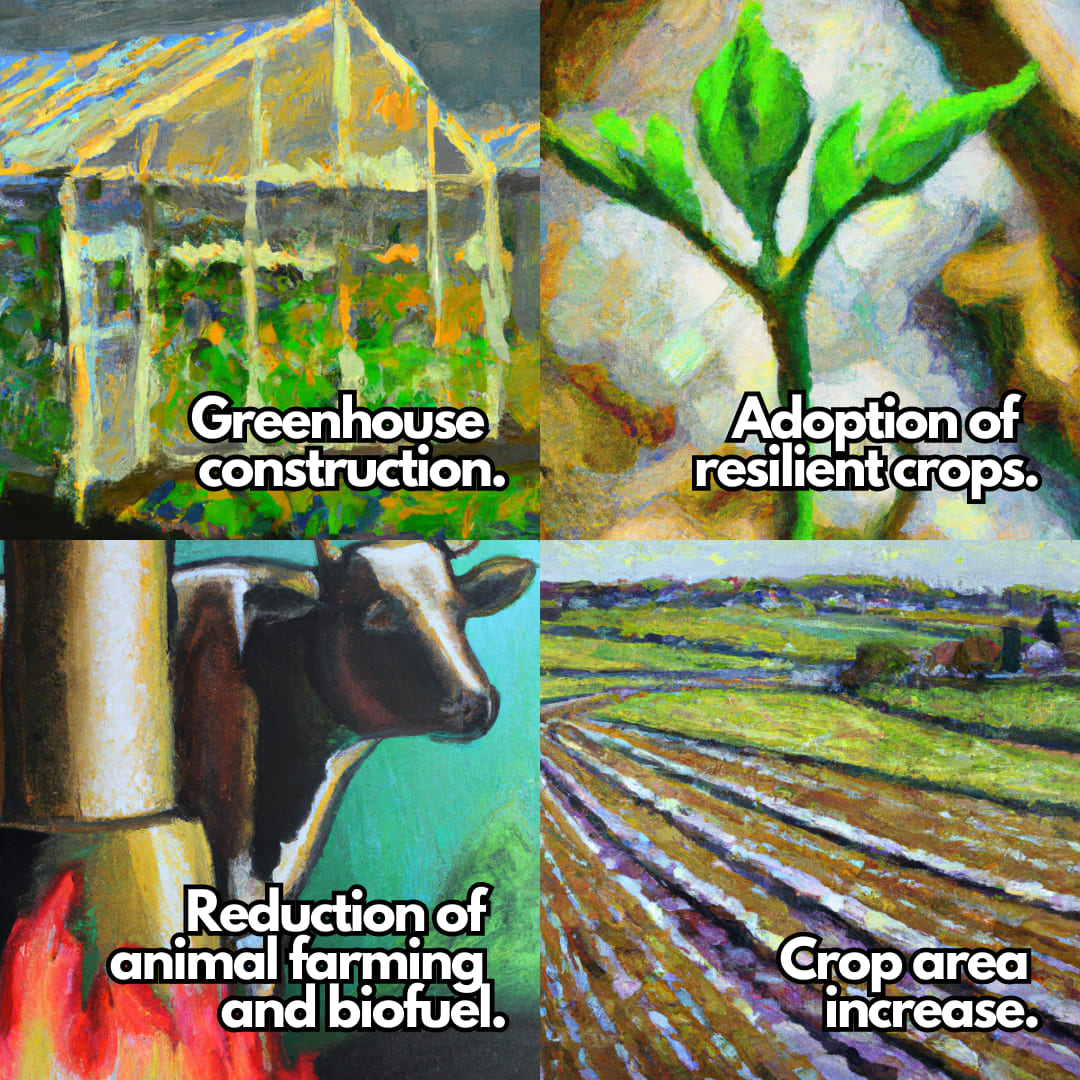To prepare in case of an Abrupt Sunlight Reduction Scenario (ASRS), it is necessary to understand the threats and vulnerabilities of the agri-food system and the current ecosystem of risk management in Argentina.
Through research, modelling, and interviews, the RCG team, in collaboration with ALLFED, has produced a report titled "Food Security in Argentina in the event of an Abrupt Sunlight Reduction Scenario (ASRS)". This strategic proposal offers a comprehensive overview of ASRS, risk management in Argentina, and presents eight preparedness recommendations divided into two categories: communication and supplies, and the production and redirection of food in the event of an ASRS. Additionally, it highlights priority actions for implementing the proposed solutions.
Download full report
If you are interested in attending our research findings presentation on May 8, 2023 at 19:00 (GMT+1). Sign up at the following link.
Executive Summary
Abrupt Sunlight Reduction Scenarios (ASRS) result from events that eject particulate matter into the upper atmosphere, reflecting and absorbing sunlight that would otherwise reach the Earth's surface. This decrease in sunlight causes a drop in global temperatures and precipitation, with devastating consequences for agriculture. Potential causes of an ASRS include large volcanic eruptions, nuclear winter, and asteroid or comet impact (ALLFED , 2022). The impact of such events is likely to last for several years, even a decade, with global implications for agriculture and food security.
According to Xia et al. (2022) an estimated 75% of the world's population could starve to death in such a severe nuclear winter scenario. If the atmosphere were to collect 150 million tons of soot, it would cause a decrease in temperature ranging between 7ºC and 15ºC. This temperature drop would be accompanied by a reduction in sunlight and precipitation, leading to a collapse in caloric production. Specifically, caloric production would fall to 10%-20% of its current value.
Some regions of the world appear to have better conditions for surviving an abrupt sunlight reduction scenario (ASRS). These include island nations like New Zealand or Australia (Boyd & Wilson, 2022) and continental countries such as Argentina, Uruguay, and Paraguay (Xia et al., 2022). After evaluating different countries in Latin America, we realized that Argentina is one of the world's leading producers and exporters of food, especially grains and oilseeds. Therefore, in the event of an ASRS, Argentina would play a crucial role in the distribution and food exportation, even if its production decreased during the scenario. It would still have greater food availability than other countries that would be more severely affected. Adapting the country's food systems quickly and effectively would make the difference between a national famine situation and producing sufficient, varied, and nutritious food with a surplus to export, thus avoiding a regional humanitarian crisis and a foreign refugee crisis.
Considering the importance of Argentina's geographical location, it is essential for the government to actively participate in the development of contingency plans aimed at addressing possible threats in the region, and the creation of an interdepartmental working group is recommended to investigate the threat posed by an ASRS and how to deal with it. The strategic initiatives aim to strengthen preparedness and specific recommendations for its focus. This report consists of 8 main recommendations, divided into communication and supply, and food production in the event of an ASRS, as well as accompanying priority actions for effective implementation:
Communication and supply

- Development of response plans to ensure food and water supply to the population in the face of this risk.
- Formulate strategies and legal frameworks for internal food rationing and waste reduction.
- Maintain open trade policies to enhance food production and facilitate access to critical inputs and materials.
- Clear and centralized communication strategy through the dissemination of the emergency management plan.
Food production

In order of priority:
- Redirection of animal feed and biofuel production resources towards human food consumption.
- Adaptation of agricultural systems to increase food production, including the deployment of solutions such as crops relocation tolerant to low temperatures and precipitation conditions, rapid construction of greenhouses taking into account the Argentine bioclimatic regions, and the expansion of cultivation areas through the adaptation of arable land currently not used for food production.
- (less prioritary) Adaptations of aquaculture to increase food production, including national algae industry reactivation and strengthening of the fishing sector.
- (less prioritary) High-tech adaptations to increase food production include industrial food technologies such as the conversion of paper and biofuel industries for lignocellulosic sugar production and the production of single-cell protein from methane.
In Argentina, the institutions that are best positioned to develop a response plan incorporating these recommendations are Secretaría de Agricultura, Ganadería y Pesca (SAGPyA), Instituto Nacional de Tecnología Agropecuaria (INTA), Oficina de Riesgo Agropecuario (ORA), Oficina de Monitoreo de Emergencias Agropecuarias (OMEGA), Secretaría de Articulación Federal de la Seguridad and Secretaría de Coordinación Militar en Emergencias. We recommend that, in the development of this plan and the formation of emergency committees, collaboration should be sought with Ministerio de Seguridad, Secretaría de Protección Civil, and Abordaje de Emergencias.
Special thanks for their help and feedback to other members of the ALLFED team: Mariana Antonietta, Michael Hinge, Farrah Jasmine Dingal, Florian Ulrich Jehn; as well as Nick Wilson and Matt Boyd from the Aotearoa NZ Catastrophe Resilience Project. René Segura Latorre contributed to the editing of the document.
References
ALLFED. (2022). A Strategic Proposal to Facilitate U.S. Food Security in an Abrupt Sunlight Reduction Scenario .pdf.
Xia, L., Robock, A., Scherrer, K., Harrison, C. S., Bodirsky, B. L., Weindl, I., Jägermeyr, J., Bardeen, C. G., Toon, O. B., & Heneghan, R. (2022). Global food insecurity and famine from reduced crop, marine fishery and livestock production due to climate disruption from nuclear war soot injection. Nature Food, 3(8), 586-596. https://doi.org/10.1038/s43016-022-00573-0
Wilson, N., Prickett, M., & Boyd, M. (2022). Estimating Food Security after Nuclear Winter: Preliminary analysis for Aotearoa New Zealand.

Very important subject! Thank you all for all of your work and dedication!
I have some questions:
How much news coverage did this report get until now in Argentina? And outside Argentina?
Has any elected politician or ministry representative reacted to this report after it was published?
Is RCG or ALLFED preparing similar reports for other countries?
How many times has the report been downloaded until now?
Hi Francisco,
Thank you for your interest, regarding your questions:
Hi Jorge, Thank you for the very fast reply! Have a good day! :)